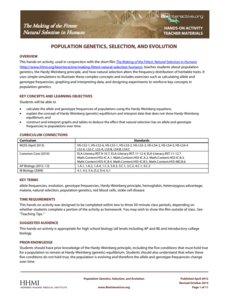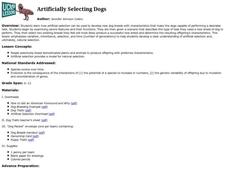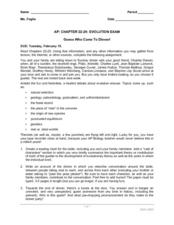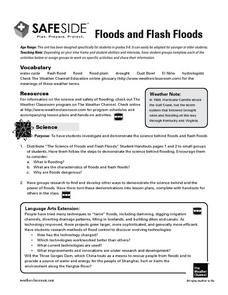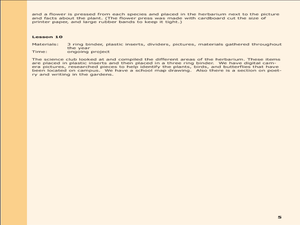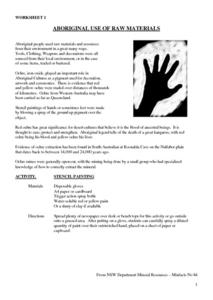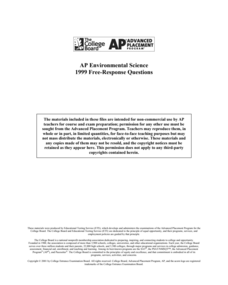Wildwood Trust
Habitats
The circle of life is all around us, from the black bears in the nearby mountains to the pile of dead leaves in the backyard. Encourage young scientists to take a critical look at the world around them with a set of lessons...
Howard Hughes Medical Institute
Population Genetics, Selection, and Evolution
The Hardy-Weinberg principle states that alleles and genotypes remain constant in the absence of evolutionary influences. Scholars complete a simple hands-on activity applying the Hardy-Weinberg principle to sample data. They observe how...
Society of Petroleum Engineers
Renewable and Nonrenewable Energy
Energize an environmental science unit on natural resources with this collection of instructional materials. From simple coloring sheets for primary grade children, to guiding questions for a high school research...
Howard Hughes Medical Institute
Recent Adaptations in Humans
You've probably spent plenty of time discussing animal adaptations with your young biologists, but what about human adaptations? Explore the evolving traits of humankind through an interactive that combines text and video clips. Scholars...
Curated OER
Artificial Selection
The second lesson in the series begins with a starter activity discussing wild versus domesticated animals. Then, scholars play a card game, with optional variations, to emphasize artificial selection. Next, they attend a field trip to a...
Curated OER
Settlement Exploration: Then and Now
NASA has crafted an imaginative and memorable series of lessons, "NASA and Jamestown Education Module." This lesson is one of the five components. In it, middle schoolers connect history and science by comparing the settlement of...
University of California
Artificially Selecting Dogs
Selective breeding has resulted in some novel and beautiful or useful dogs over the years. Using the American Foxhound as an example, genetics learners find out how and why they came about. Then, in small groups, they select breeds to...
Curated OER
Guess Who Came to Dinner!
An exceptionally creative approach is taken to assessing your biologists' grasp of natural selection concepts. They are to imagine hosting Charles Darwin for dinner and having, to their surpise, a few other noted scientists crash the...
STEM for Teachers
Tsunami!
How does the depth of an ocean affect the speed of a tsunami's waves? Use Jell-o, graham crackers, and marshmallows to model the effects of an underwater earthquake and its resulting tsunami. The lesson includes hands-on activities,...
Curated OER
Floods and Flash Floods
Junior geologists, hydrologists, or meteorologists simulate what happens during the flooding of a river and demonstrate factors that contribute to flash flooding. This outstanding resource provides a vocabulary list, online resources,...
Curated OER
Nature Oriented Kindness Projects
Students complete various nature activities where they work together to create a butterfly garden, plant flowers, learn about nature survival, and more. In this nature lesson plan, students work together in groups and display kindness...
Curated OER
Compare Human-made Objects with Natural Objects
Learners examine and observe how many human-made objects get their basic design from things in nature. They listen to the book "Nature Got There First," compare/contrast hollow bones with drinking straws, bird beaks and tool pliers, and...
Curated OER
Forces of Nature Vocabulary Quiz
In this science worksheet, students draw lines to match 13 words pertaining to forces of nature to their definitions in another column. Example: tornado, tide, erosion, pressure.
Curated OER
Forces of Nature Cryptogram Worksheet
In this forces of nature worksheet, students unscramble the letters in 9 words pertaining to storms and other forces of nature. Using the answers, students decode a cryptogram puzzle. There is no word list.
Curated OER
Forces of Nature Group Creative Writing
In this forces of nature activity, students collaborate with others to write a group story. Students have 25 minutes to write a story about forces of nature. Students must use the 14 words in the box.
Virginia Department of Education
Evidence of Evolution
What an impression fossils make! In this activity, aspiring paleontologists view fossils and construct a timeline to further understand how the lack of natural adaptation caused historical organisms to become extinct. While they...
Scholastic
Study Jams! Soil
Seven superb slides sharpen science students' scoop on soil. In viewing them and reading the accompanying captions, your class will uncover the importance, different types, horizons, and protection of soil. They can then assess their new...
National Nanotechnology Infrastructure Network
Is Measuring an Art or a Science?
Not only do future engineers learn the difference between accuracy and precision, they also get some hands-on experience using different measuring tools.
Virginia Department of Education
Adaptation and Evolution
Um may be the atomic symbol for confusion, but it won't be needed in this lesson. Scholars rotate through seven stations completing experiments, hands-on activities, writing exercises, and analysis. Stations include material on...
NSW Department Mineral Resources
Aboriginal Use of Raw Materials
What's the difference between base metals and precious metals? Experimenting with natural metals is an interesting way for kids to learn about the world around them. Use a resource that contains over 30 pages of worksheets and...
College Board
1999 AP® Environmental Science Free-Response Questions
Pollution is a real concern in most areas of Earth. A four-question AP® assessment has learners analyze data related to water pollution and air pollution as well as consider the pros and cons of recycling. Each question has several...
College Board
2001 AP® Environmental Science Free-Response Questions
Water quality testing often reveals interesting facts about the local environment. Scholars respond to several AP® questions highlighting topics such as air pollution, water pollution, and the spread of disease. Each question requires a...
Curated OER
Is That Natural?
Students examine how they use and waste natural resources. They participate in a class discussion about natural resources, in small groups complete a worksheet identifying ways students misuse natural resources, and create an...
Curated OER
Does Global Warming Increase the Intensity of Atmospheric Natural Disasters?
Students study global warming by communicating the problem, process and solutions. In this global lesson students use graphs, research and write a critical stance on natural disasters.
Other popular searches
- History and Nature of Science
- The Nature of Science
- Nature of Science Biology
- Nature of Science Inquiry
- Nature of Science Physics
- History Nature of Science
- Science Patterns in Nature
- Genetics Nature of Science
- Teaching Nature of Science
- Nature of Science Weather
- Genetic Nature of Science
- Science and Nature



